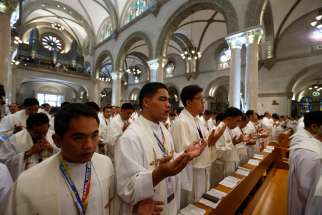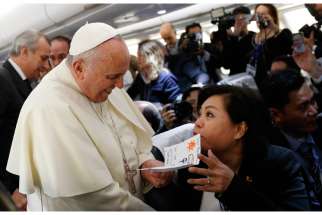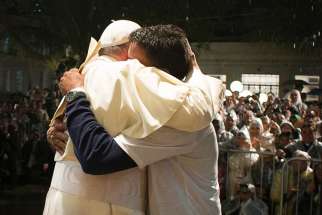Pope Francis visits Asia
Pope Francis made an apostolic visit to Sri Lanka and the Philippines Jan. 13-19, 2015. The Sri Lanka highlight was the canonization of St. Joseph Vaz. In the Philippines, the Pope celebrated Mass with six million people in Manilla. All the articles from his trip are listed below, including some Canadian reaction written by Register reporters Michael Swan and Evan Boudreau.
MANILA, Philippines - The Gospel has the power to transform society, ensuring justice and care for the poor, but that can happen only if Christians -- beginning with the church's ministers -- allow the Gospel to transform them, Pope Francis said.
Filipino Catholic media already planning follow-up to papal visit
MANILA, Philippines - Long before Pope Francis left the Vatican for his January trip to Asia, Jesuit Father Emmanuel "Nono" Alfonso and his colleagues were already working on the "what's next" part of hosting a papal trip.
Better churches will keep people in the pews
It’s no secret that today there’s been a massive drop-off in church attendance. Moreover that drop-off is not paralleled by the same widespread growth in atheism and agnosticism.
Pope warns against the ‘false sense of compassion’ in euthanasia
VATICAN CITY - Pope Francis has warned doctors and ethicists on several hot-button social issues, attacking abortion, embryonic stem cell research and euthanasia as “playing with life” and “a sin against God.”
No favourites, only justice, compassion
21st Sunday in Ordinary Time (Year A) Aug. 24 (Isaiah 22:15, 19-23; Psalm 138; Romans 11:33-36; Matthew 16:13-20)
No one has an absolute right to a position of trust and authority. Along with authority there is responsibility and accountability, and however slowly the wheels of justice turn they grind exceedingly fine. Shebna discovered this to his chagrin when he was fired by one against whom there is no appeal — God. The people of Israel believed God raised up individuals to govern the nation, but they were also positive God could and would dismiss anyone who abused that trust.
Simple justice, compassion is what the Lord asks of us
Third Sunday of Advent (Year C) Dec. 16 (Zephaniah 3:14-18; Isaiah 12; Philippians 4:4-7; Luke 3:10-18)
Unjust law must go
The photos were startling: a military helicopter, heavily armed soldiers and a mentally handicapped girl being rushed through a prison courtyard to board a flight to safety.
Rimsha Masih must have been terrified. A blanket shrouded her head to hide her face from the many fanatics in Pakistan demanding her death. But shielding her identity also had the powerful effect of exposing yet again the outrage of Pakistan’s blasphemy laws.
Masih was accused of burning pages of the Quran, arrested, charged with the capital offence of blasphemy and locked up for three weeks. Amid howls for justice and decency, a judge ruled the charges defied belief and granted her bail. Soon afterward, Masih’s jail cell was given to a Muslim cleric who had incited a crowd against her. He was arrested on suspicion of planting evidence on the girl in a plot to foment hatred for Christians and drive them from their homes.
Masih’s case quite rightly garnered international headlines. Even before the cleric’s plot was exposed, demands for her release were heard around the world. Her age is disputed (her family said she is 11 while a medical report puts it at 14) but it is clear she is a minor with the mental capacity of a much younger girl.
Her release and the arrest of her accuser are welcomed signs that, at some level, the condemnation by various governments, Church groups and lay organizations of Pakistan’s blasphemy outrages are being heard. The Canadian government and the Canadian Conference of Catholic Bishops, to name just two, have been commendably vocal in denouncing the blasphemy laws. They’ve been joined by a core of Pakistanis, both Christian and Muslim, who’ve advocated bravely for tolerance despite obvious risks.
Yet it would be a mistake to crow too loudly over one small victory.
Masih received bail but she is still facing the original charges and a conviction could still bring the death penalty. Many Pakistanis were outraged at her arrest but many others still call for death to her and her family. The judge acted humanely in granting bail but prosecutors still have not dropped the outrageous charges against the traumatized girl. The army provided a helicopter and soldiers to fly Masih to safety but the government still shows no readiness to replace these vile laws with laws that guarantee dignity and respect for religious minorities.
A Pakistani study reveals that 250 blasphemy cases have occurred there since 1987 and 52 people have been killed after being accused, often falsely, of blasphemy. So Masih’s case is an international reminder of Pakistan’s obstinacy on this issue. The blasphemy laws must go.
Showing compassion to one traumatized, fraudulently accused, mentally handicapped child really is the least Pakistani authorities could do.







